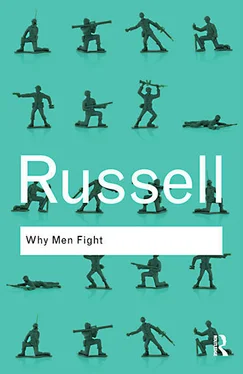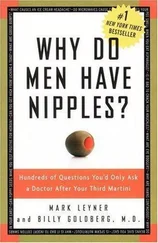Bertrand Russell - Why Men Fight
Здесь есть возможность читать онлайн «Bertrand Russell - Why Men Fight» весь текст электронной книги совершенно бесплатно (целиком полную версию без сокращений). В некоторых случаях можно слушать аудио, скачать через торрент в формате fb2 и присутствует краткое содержание. Город: London, Год выпуска: 2010, ISBN: 2010, Издательство: Routledge, Жанр: Философия, Публицистика, на английском языке. Описание произведения, (предисловие) а так же отзывы посетителей доступны на портале библиотеки ЛибКат.
- Название:Why Men Fight
- Автор:
- Издательство:Routledge
- Жанр:
- Год:2010
- Город:London
- ISBN:978-0-203-86469-2
- Рейтинг книги:3 / 5. Голосов: 1
-
Избранное:Добавить в избранное
- Отзывы:
-
Ваша оценка:
- 60
- 1
- 2
- 3
- 4
- 5
Why Men Fight: краткое содержание, описание и аннотация
Предлагаем к чтению аннотацию, описание, краткое содержание или предисловие (зависит от того, что написал сам автор книги «Why Men Fight»). Если вы не нашли необходимую информацию о книге — напишите в комментариях, мы постараемся отыскать её.
— discusses war, pacifism, reason, impulse and personal liberty, and greatly contributed to Russells fame as a formidable social critic and anti-war activist.
“The supreme principle, both in politics and in private life, should be to promote all that is creative, and so to diminish the impulses and desires that centre around possession.”
Bertrand Russell “Russell is one of the most profound thinkers of the modern age.”
The New York Times
Why Men Fight — читать онлайн бесплатно полную книгу (весь текст) целиком
Ниже представлен текст книги, разбитый по страницам. Система сохранения места последней прочитанной страницы, позволяет с удобством читать онлайн бесплатно книгу «Why Men Fight», без необходимости каждый раз заново искать на чём Вы остановились. Поставьте закладку, и сможете в любой момент перейти на страницу, на которой закончили чтение.
Интервал:
Закладка:
Why do men acquiesce in the power of the State? There are many reasons, some traditional, some very present and pressing.
The traditional reason for obedience to the State is personal loyalty to the sovereign. European States grew up under the feudal system, and were originally the several territories owned by feudal chiefs. But this source of obedience has decayed, and probably now counts for little except in Japan, and to a lesser extent in Russia.
Tribal feeling, which always underlay loyalty to the sovereign, has remained as strong as it ever was, and is now the chief support for the power of the State. Almost every man finds it essential to his happiness to feel himself a member of a group, animated by common friendships and enmities and banded together for defence and attack. But such groups are of two kinds: there are those which are essentially enlargements of the family, and there are those which are based upon a conscious common purpose. Nations belong to the first kind. Churches to the second. At times when men are profoundly swayed by creeds national divisions tend to break down, as they did in the wars of religion after the Reformation. At such times a common creed is a stronger bond than a common nationality. To a much slighter extent, the same thing has occurred in the modern world with the rise of socialism. Men who disbelieve in private property, and feel the capitalist to be the real enemy, have a bond which transcends national divisions. It has not been found strong enough to resist the passions aroused by the present war, but it has made them less bitter among socialists than among others, and has kept alive the hope of a European community to be reconstructed when the war is over. In the main, however, the universal disbelief in creeds has left tribal feeling triumphant, and has made nationalism stronger than at any previous period of the world’s history. A few sincere Christians, a few sincere socialists, have found in their creed a force capable of resisting the assaults of national passion, but they have been too few to influence the course of events or even to cause serious anxiety to the Governments.
It is chiefly tribal feeling that generates the unity of a national State, but it is not only tribal feeling that generates its strength. Its strength results principally from two fears, neither of which is unreasonable: the fear of crime and anarchy within, and the fear of aggression from without.
The internal orderliness of a civilized community is a great achievement, chiefly brought about by the increased authority of the State. It would be inconvenient if peaceable citizens were constantly in imminent risk of being robbed and murdered. Civilized life would become almost impossible if adventurous people could organize private armies for purposes of plunder. These conditions existed in the Middle Ages, and have not passed away without a great struggle. It is thought by many— especially by the rich, who derive the greatest advantage from law and order—that any diminution in the power of the State might bring back a condition of universal anarchy. They regard strikes as portents of dissolution. They are terrified by such organizations as the Confédération Générale du Travail and the International Workers of the World. They remember the French Revolution, and feel a not unnatural desire to keep their heads on their shoulders. They dread particularly any political theory which seems to excuse private crimes, such as sabotage and political assassination. Against these dangers they see no protection except the maintenance of the authority of the State, and the belief that all resistance to the State is wicked.
Fear of the danger within is enhanced by fear of the danger without. Every State is exposed at all times to the risk of foreign invasion. No means has hitherto been devised for minimizing this risk except the increase of armaments. But the armaments which are nominally intended to repel invasion may also be used to invade. And so the means adopted to diminish the external fear have the effect of increasing it, and of enormously enhancing the destructiveness of war when it does break out. In this way a reign of terror becomes universal, and the State acquires everywhere something of the character of the Comité du Salut Public.
The tribal feeling out of which the State develops is natural, and the fear by which the State is strengthened is reasonable under present circumstances. And in addition to these two, there is a third source of strength in a national State, namely patriotism in its religious aspect.
Patriotism is a very complex feeling, built up out of primitive instincts and highly intellectual convictions. There is love of home and family and friends, making us peculiarly anxious to preserve our own country from invasion. There is the mild instinctive liking for compatriots as against foreigners. There is pride which is bound up with the success of the community to which we feel that we belong. There is a belief, suggested by pride but reinforced by history, that one’s own nation represents a great tradition and stands for ideals that are important to the human race. But besides all these, there is another element, at once nobler and more open to attack, an element of worship, of willing sacrifice, of joyful merging of the individual life in the life of the nation. This religious element in patriotism is essential to the strength of the State, since it enlists the best that is in most men on the side of national sacrifice.
The religious element in patriotism is reinforced by education, especially by a knowledge of the history and literature of one’s own country, provided it is not accompanied by much knowledge of the history and literature of other countries. In every civilized country all instruction of the young emphasizes the merits of their own nation and the faults of other nations. It comes to be universally believed that one’s own nation, because of its superiority, deserves support in a quarrel, however the quarrel may have originated. This belief is so genuine and deep that it makes men endure patiently, almost gladly, the losses and hardships and sufferings entailed by war. Like all sincerely believed religions, it gives an outlook on life, based upon instinct but sublimating it, causing a devotion to an end greater than any personal end, but containing many personal ends as it were in solution.
Patriotism as a religion is unsatisfactory because of its lack of universality. The good at which it aims is a good for one’s own nation only, not for all mankind. The desires which it inspires in an Englishman are not the same as the desires which it inspires in a German. A world full of patriots may be a world full of strife. The more intensely a nation believes in its patriotism, the more fanatically indifferent it will become to the damage suffered by other nations. When once men have learnt to subordinate their own good to the good of a larger whole, there can be no valid reason for stopping short of the human race. It is the admixture of national pride that makes it so easy in practice for men’s impulses towards sacrifice to stop short at the frontiers of their own country. It is this admixture that poisons patriotism, and makes it inferior, as a religion, to beliefs which aim at the salvation of all mankind. We cannot avoid having more love for our own country than for other countries, and there is no reason why we should wish to avoid it, any more than we should wish to love all individual men and women equally. But any adequate religion will lead us to temper inequality of affection by love of justice, and to universalize our aims by realizing the common needs of man. This change was effected by Christianity in Judaism, and must be effected in any merely national religion before it can be purged of evil.
In practice, patriotism has many other enemies to contend with. Cosmopolitanism cannot fail to grow as men acquire more knowledge of foreign countries by education and travel. There is also a kind of individualism which is continually increasing, a realization that every man ought to be as nearly free as possible to choose his own ends, not compelled by a geographical accident to pursue ends forced upon him by the community. Socialism, syndicalism, and anti-capitalist movements generally, are against patriotism in their tendency, since they make men aware that the present State is largely concerned in defending the privileges of the rich, and that many of the conflicts between States have their origin in the financial interests of a few plutocrats. This kind of opposition is perhaps temporary, a mere incident in the struggle of labour to acquire power. Australia, where labour feels its triumph secure, is full of patriotism and militarism, based upon determination to prevent foreign labour from sharing the benefits of a privileged position. It is not unlikely that England might develop a similar nationalism if it became a socialist State. But it is probable that such nationalism would be purely defensive. Schemes of foreign aggression, entailing great loss of life and wealth in the nation which adopts them, would hardly be initiated except by those whose instincts of domination have been sharpened through the power derived from private property and the institutions of the capitalist State.
Читать дальшеИнтервал:
Закладка:
Похожие книги на «Why Men Fight»
Представляем Вашему вниманию похожие книги на «Why Men Fight» списком для выбора. Мы отобрали схожую по названию и смыслу литературу в надежде предоставить читателям больше вариантов отыскать новые, интересные, ещё непрочитанные произведения.
Обсуждение, отзывы о книге «Why Men Fight» и просто собственные мнения читателей. Оставьте ваши комментарии, напишите, что Вы думаете о произведении, его смысле или главных героях. Укажите что конкретно понравилось, а что нет, и почему Вы так считаете.












